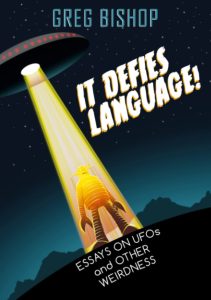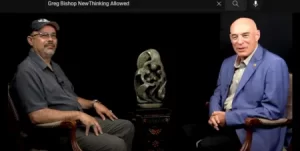
By KEN KORCZAK
Ufologist Greg Bishop takes us on a strange journey into the multifaceted weirdness of the paranormal
Greg Bishop is a long-standing UFO warrior who got sucked into the bizarre vortex of ufology when he was just a boy. Somewhere between the ages of eight and 10, he started checking out books on paranormal topics at his local library.
His father had encouraged his children to read. It didn’t matter to him if young Greg was focusing on the bizarre: UFOs, Bigfoot, ESP, the Loch Ness monster …
At least he was reading.
This early diet of paranormal lit sowed the seeds— but they would have to wait until Bishop reached his mid-twenties for them to sprout.
After falling into the all-too-common American experience trap of drinking too much and partying too much through high school and college, Bishop woke up one day to find himself a depressed twenty-something. He was adrift and perhaps anesthetized by the psychic Novocain of existential angst.
It was an idea by the wildly creative and “Discordian” writer Robert Anton Wilson that managed to penetrate his mental state. Wilson proposed what he called “The eight basic winners and losers scripts.” Out of these suggestions, Bishop distilled this idea:
“Everything is going to work out and you have the power to change those things in your life that you do not like.”
For Bishop, that meant choosing a topic and purpose and then getting so busy working on it that you would not have time for anything else. Right around that time fate gave him a nudge. He happened to meet Bill Moore, a man Bishop described as having “a lot of exciting ideas.” Moore was destined to become a major figure within the exotic milieu of UFO lore and one of its most controversial advocates.
Moore is credited with “the discovery” of the now famous/infamous (and forever contentious) Majestic-12 papers. He would also go on to co-author one of the most influential books in UFO history, The Roswell Incident, published in 1980 along with co-author Charles Berlitz.
To make a long story short, Bishop was off and running in the rarified career of ufology and as stenographer of the strange. His way of engaging in the field was mostly as a writer and communicator.
In 1991, he established The Excluded Middle, a small press magazine that explored all the subjects that a guy like Robert Anton Wilson certainly would have liked — it was all about UFOs, psychedelic experiences, crypto-creatures, consciousness, strange happenings and weird philosophies.

In 2000, a collection of articles from The Excluded Middle was put together in an offering called Wake Up Down There! and Bishop was a published book author. He went on to pen several other books, including Project Beta (Simon & Schuster), the tragic story of how a wealthy businessman was sucked into the world of UFOs, government psyops, disinformation and sundry mischief.
This book is now a classic in the field, partially because of the way it mapped out the ineluctable reality that what goes on in ufology is fantastically difficult to pin down in a simplistic way. Ufology is so odd, layered, variegated and complex that anyone who believes they understand what’s truly going on is at least partially caught up in a rash of their own preferred, hard-earned delusions.
This latter situation is reflected in the Greg Bishop title I am reviewing today:
It Defies Language: Essays on UFOs and Other Weirdness
In this book, Mr. Bishop takes us on a breezy sojourn through his thoughts and experiences gleaned from his now decades of persistent pursuit of attempting to eke out some understanding of the UFO phenomenon.
He veers from one extreme to another — from the stark realization that much about UFOs is so often depressing bunk — to confronting the tantalizing evidence that something “nonhuman” has been interacting with humankind for thousands of years. But just what is it? That’s the question that drives Greg Bishop. That’s what makes him the kind of UFO junkie I can appreciate — a man who has learned to live gracefully with uncertainty.
He knows that just when you think you’ve found some solid footing about who or what UFOs are, the game changes suddenly and quixotically. Fact becomes fallacy, truth becomes fraud — but just when you’re ready to chuck it all and give up, guess what?
Something happens to suggest that: “They’re h-e-e-e-r-e!”

And so, the devotee is off and running again on the universe’s most mercurial quest. Bishop’s journey has hurled him along a path that involves reaching for answers and grappling to suggest innovative models.
For example, he suggests that the 1950s contactee era, ala the likes of George Adamski, George Van Tassel, Howard Menger, et.al., might be viewed (or explained) as a kind of post-modern art movement. Maybe it was an attempt to inject radical ideas into the collective consciousness of humanity by leveraging the benign space visitor motif?
Was this “art movement” a conscious creation of the various Adamski and Van Tassel types? Were these guys blatant bunko artists — or perhaps they were unwilling pawns of actual alien influences, meddling with the mind of humanity for a planetary social engineering project?
Who knows.
Note: Bishop and co-author Adam Gorightly released a more in-depth study of the 1950 contactee phenomenon in 2018 with their book “A” is for Adamski.

While Bishop conjures new paradigms, he also decries our penchant to latch on to pre-packaged explanations for what UFOs are, especially the long-dominant belief that, “They are alien beings from other planets visiting the Earth in nuts-and-bolts spacecraft.”
He says a statement like this is “so loaded with semantic baggage … it is meaningless.” He writes:
“Belief implies a lack of critical thinking. UFOs are automatically assumed by most to be structured vehicles piloted by intelligent beings from other planets. They don’t need to be … there are many reasons that a skeptical mindset and lack of assumptions make the subject more interesting and worthy of consideration. To settle on one explanation is to shut down serious inquiry.”
That goes for all the theories and models floated in the past 70 years — that UFOs are interdimensional beings/craft, time travelers, ancient ‘gods’ or exotic but indigenous races that co-evolved with humanity right here on earth, or that the UFO phenomenon is a manifestation of consciousness evolution of the psyche of mankind itself.
Hint: It may be all of the above.
Ultimately, however, the brutal situation is that we still find ourselves mired in a radical state of: “We just don’t know.” That does not mean that we should stop clawing at our intellects to flesh out some measure of understanding, Bishop suggests.
So, I found It Defies Language a stimulating read — and that will hold true for both the extremely experienced UFO enthusiasts (guys like me who have read thousands of books and articles and done about 150 on-the-ground investigations) to the casual reader who just likes to browse a UFO book occasionally.
Be aware that this is one of those books that has been cobbled together from a collection of the author’s blog posts and other published articles from over the years. These kinds of books tend to suffer a bit from lack of focus or a certain unevenness in the quality of what’s included and what probably should have been cut.
However, It Defies Language challenges, entertains and invites us to stretch our minds.
Greg Bishop urges us to think outside the box, shake off our preconceived notions, guard against getting rutted in outmoded models, avoid fallacies and traps — and beseech our Higher Power for the wisdom to know the difference.
Additional note: Greg Bishop hosts a podcast found here: Radio Misterioso
For More in-depth reviews of UFO books & authors, please see: KEN-ON-MEDIUM
